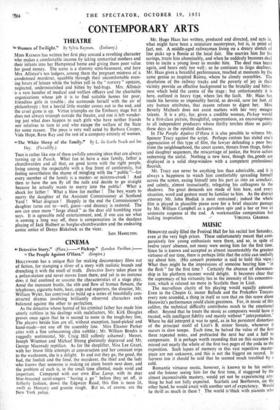CINEMA
04 Detective Story." (Plaza.) --“ Pickup." (London Pavilion.) “ The People Against O'Hara." (Empire.)
HOLLYWOOD has a unique flair for making- documentary films out of fiction, for stamping a sliver of a story with realistic brands and drenching it with the smell of truth. Detective Story takes place in a police-station and never moves from there, and yet in no instance does it feel confined or assume the characteristics of a stage play. Amid the incessant bustle, the ebb and flow of human flotsam, the telephones, cigarette butts, heat, cops and reporters, the director, Mr. William Wyler, has contrived to build up a series of beautifully con- structed dramas involving brilliantly observed characters each balanced against the other to perfection.
As the detective whose hatred of his criminal father has made him utterly ruthless in his dealings with malefactors, Mr. Kirk Douglas proves once again that he is second to none in the tough-boy line. The players beside him are all, without exception, hand-picked and hand-made—not one off the assembly line. Miss Eleanor Parker cries with a fine unbecoming chin wobble ; Mr. William Bendix is ruggedly sentimental, Mr. Craig Hill sullenly ashamed ; Messrs. Joseph Wiseman and Michael Strong gloriously depraved and Mr. George Macready reptilian. As for the shoplifter, Miss Lee Grant, with her brave little attempts at conversation and her constant trips to the washroom, she is a delight. In and out they go, the good, the bad, the foolish and the fond, the murderer, the thief and the lady who knows that someone is making an atom bomb next door, and the problem of each is, in the small time allotted, made vivid and important. Compared with our own Blue Lamp, with its dear blue-breasted carol-singers " having a go " before they set off, in fatherly fashion, down the Edgware Road, this film is neon lit, swift as Mercury and granite rough. But so, of course. are the New York police.
Mr. Hugo Haas has written, produced and directed, and acts in, what might have been a miniature masterpiece, but is, in point of fact, not. A middle:aged railwayman living on a dreary stretch of line picks up a floosie at the local fair. She marries him for his savings, treats him abominably, and when he suddenly becomes deaf tries to incite a young lover to murder him. The deaf man hears again, and hears only too well ; so he continues to feign deafness. Mr. Haas gives a beautiful performance, touched at moments by the same genius as inspired Raimu, whom he closely resembles. The desolation of the railway tracks and the poverty of joy in their vicinity provide an effective background to the brutality and bitter- ness which hold the centre of the stage ; but unfortunately it is here, outlined in heavy type, where lies the fault. Mr. Haas has made his heroine so impossibly horrid, so devoid, save for lust, of any human attributes, that reason refuses to digest her. Miss Beverly Michaels does not assist matters with her very meagre talents. It is a pity, for, given a credible woman, Pickup would be a first-class picture, thoughtful, unpretentious, an encouragement to all independent producers whose thrifty torches shine so palely these days in the opulent darkness.
In The People Against O'Hara it is also possible to witness Mr. Spencer Tracy against the script. Perhaps custom has staled one's appreciation of this type of film, the lawyer defending a poor boy from the neighbourhood, the court scenes, threats from thugs, father and daughter sequences, the miscarriage of justice, the brave action redeeming the sinful. Nothing is new here, though thesgoods are displayed in a solid shop-window with a competent professional flourish.
Mr. Tracy can never be anything less than admirable, and it is always a happiness to watch him comfortably spreading himself across the screen, easing himself into his part as into an armchair, and calmly, almost insouciantly, relegating his colleagues to the shadows. No great demands are made of him here, and every situation, word and gesture must be familiar to him. As the district attorney Mr. John Hodiak is most restrained ; indeed the whole film is played in plausible piano save for a brief staccato passage by Mr. William Campbell as a garrulous spiv and a bar or two of sostenuto suspense at the end. A workmanlike composition but


































 Previous page
Previous page